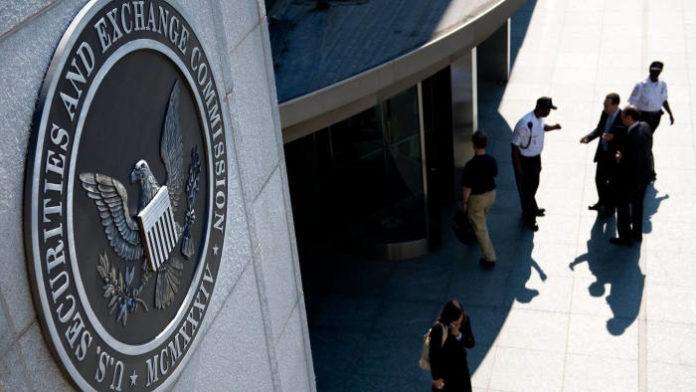
Glass Lewis and Institutional Shareholder Services have a stranglehold on a booming industry: advising investors on how to cast their votes at companies’ annual meetings.
This has given the two privately owned companies considerable sway on everything from executive pay to environmental policies, just as issues of governance race up the corporate agenda.
Yet early next year, the two are likely to find themselves the subject of a Securities and Exchange Commission vote that is designed to cut them down to size, but which they warn risks damaging corporate governance across America.
US regulators are one step away from passing new rules governing proxy advisers, as Glass Lewis, ISS and their smaller competitors are known. They include forcing them to reveal their voting recommendations to a company’s management before they are sent to its shareholders.
The SEC vote would cap a lengthy fight that has simmered for several years but recently erupted. It pits proxy advisers and many large asset managers against some of America’s biggest companies, including ExxonMobil and Chevron, who claim the groups are too powerful and beset by conflicts of interest.
While heartening those who have championed the proposals such as the US Chamber of Commerce and the National Association of Manufacturers, the prospect of the new rules passing early in 2020 has galvanised some institutional investors who rely on proxy advisers.
“People are pretty agitated about this,” said Ken Bertsch, executive director at the Council of Institutional Investors, which is based in Washington and represents shareholders with $40tn in assets. “The SEC seems to be rushing to do this. It may be politically geared. The evidence [for the new rules] is very shaky.”
The rise of proxy advisers dates back to the turn of the century when a wave of corporate scandals, including Enron and WorldCom, turned the spotlight on the failings of shareholders in helping to police companies. Their influence was further strengthened after the SEC adopted a rule in 2003 that required investment advisers to have voting procedures in place on how to vote on the issues at AGMs.
ISS, which was founded in 1985, has been one of the biggest winners and was acquired by private equity firm Genstar Capital in 2017. It makes millions of voting recommendations a year, and its clients include large and small asset managers, including BlackRock, Allianz Global Investors and Legal & General Investment Management.
Glass Lewis, which was established in 2003, is owned by the Ontario Teachers’ Pension Plan Board and Alberta Investment Management Corporation.
However, their growing clout began to attract the scrutiny of US business lobby groups, as well as some of corporate America’s best-known leaders. In 2013, Jamie Dimon, chief executive of JPMorgan Chase, blasted shareholders who rely on proxy advisers as “lazy”, after Glass Lewis and ISS advised the bank’s investors to vote against his pay and to appoint an independent chairman.
Industry observers say the arrival of Donald Trump in the White House injected new momentum into the lobbying against proxy advisers, giving the SEC a more pro-business tilt.
The SEC’s commissioners split along political lines last month when they proposed the proxy adviser regulations — a prelude to the final vote next year.
To critics, such as those at the US Chamber of Commerce, the charge sheet against proxy advisers is simple. First, the proxy process at shareholder meetings has become far too costly for companies. Second, ISS and Glass Lewis both have conflicts of interest, they say, particularly as ISS sells consulting services through a subsidiary to public companies to help them improve their corporate governance. Finally, there are concerns about factual errors and misplaced accusations in the voting reports they produce.
Tom Quaadman, executive vice-president at the US Chamber of Commerce, said many private businesses had told him that the power wielded by ISS and Glass Lewis was one of the reasons private companies were reluctant to go public.
As the battle has intensified over the past 18 months, the US Chamber of Commerce and the NAM paid for a six-figure advertising campaign about the “growing risk” proxy advisers pose. NAM was also one of the founding members last year of Main Street Investors Coalition, a group that has been critical of proxy advisers.
The accusations are rejected by proxy advisers, who say that moves to tighten regulation stem from the uncomfortable spotlight their voting recommendations have put on executive pay as well as social and environmental issues.
“There would naturally be some tension between companies and organisations that write about them,” said Lorraine Kelly, head of governance solutions at ISS, but pay and environmental votes “seemed to galvanise lobby groups”.
Ms Kelly rebuts claims of a conflict of interest, arguing that there is a “very rigorous firewall” between the two divisions at ISS, while dismissing criticism that its reports are error-strewn.
Last year, a report commissioned by the American Council for Capital Formation, a non-profit, found 139 purported “proxy adviser errors” across 94 different companies. But in a letter to the SEC last month, the CII said that when it delved into the ACCF report, it found that “most of the claimed errors were actually disagreements on analysis and methodologies.”
A spokesperson for Glass Lewis said: “We believe the conditions the SEC is attempting to impose on proxy advisers are averse to the interests of shareholders.”
With the battle set to reach a climax early next year, some asset managers say it is the public whose savings are tied up in the stock market who will ultimately be the losers if the rules are passed.
“We think [the proposed rule] is not helpful to us as institutional investors when holding companies to account,” said Euan Stirling, head of stewardship at Aberdeen Standard Investments, the $669.1bn UK asset manager. “It will make the job more difficult and add costs. It will be the ordinary savers who have to pay the costs.”
It is a view echoed by Nell Minow, vice-chair of ValueEdge Advisors and a co-founder of ISS. She said SEC rules should be based on a cost-benefit analysis that the regulator has failed to provide in this case.
“It is completely counter to everything that the SEC should be doing. There is no benefit to investors whatsoever,” said Ms Minow.
In a statement, SEC spokeswoman Natalie Strom said the agency’s proposal “was designed to bring greater accuracy and transparency to investors who rely on proxy voting advice businesses”.
There is also concern that the higher costs that new regulations would bring will hurt smaller players such as Minerva and Pircharder, and deter new entrants to a market in need of competition. ISS and Glass Lewis have more than 90 per cent of the market.
With public consultation on the proposed rules open until early February, the next two months are expected to unleash a final frenzy of lobbying from both sides. Several big investors, such as the head of New York City’s $207bn retirement funds, have already petitioned the SEC to abandon its plans.
In a letter to the SEC last month, Scott Stringer, City of New York comptroller, said: “In light of the harm and costs that the Proposal is likely to impose on investors, and the benefits it will bestow upon the corporate management who have aggressively lobbied for it, investors are left to wonder as to the problems that the SEC is seeking to remedy with its proposal.”
Sarah Wilson, chief executive of Minerva, a UK-based proxy adviser, said: “It is now down to asset owners and asset managers who take governance seriously to voice their views.”
But business lobby groups are already quietly celebrating. “We anticipate this is going to be completed early next year,” said Mr Quaadman.






